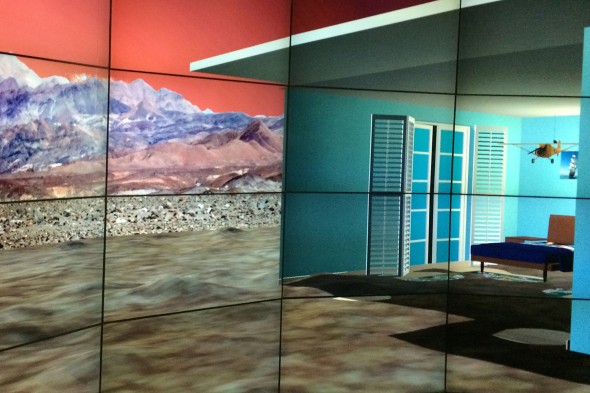Virtual immersion in 3-D storytelling

“There is nothing quite like the actual immersion of being surrounded by stereoscopic screens,” says filmmaker Scott Rettberg of “Hearts and Minds.”
Two new films will be presented July 7 that use cutting-edge computer visualization resources to give viewers an immersive experience unlike any other.
“We talk a lot about immersion in storytelling, but there is nothing quite like the actual immersion of being surrounded by stereoscopic screens,” said Scott Rettberg, professor of digital culture at the University of Bergen, Norway.
“Hearts and Minds, The Interrogation Project” and “Toxi*City” will be shown in the Electronic Visualization Lab, located in the Engineering Research Facility.
“Hearts and Minds” will be shown in the EVL’s 3-D immersive Cave2, one of only two such facilities in the world.
Based on interviews with U.S. soldiers serving in Iraq who were involved in interrogations and torture, the interactive narrative places the viewer in an environment that juxtaposes ordinary, everyday objects with the surreal landscape of a strange land.
The project grew from a meeting between Rettberg and Daria Tsoupikova, associate professor of new media design, while Tsoupikova was in Europe on a Fulbright scholarship. They shared a mutual interest in using technology in storytelling and began to look for a project to collaborate on.
Tsoupikova’s work in the EVL explores art using virtual reality and 3-D modeling.
“I’m very interested in the bridge between real life and live performance and virtual reality,” she said.
Rettberg, who studies electronic literature, worked on the project during a sabbatical at UIC with Tsoupikova and Roderick Coover, director of the graduate program in film and media arts at Temple University.
“The people here at the EVL have been incredibly generous, with everyone pitching in,” Rettberg said, including doctoral student Arthur Nishimoto and senior research programmer Lance Long.
“Toxi*City” uses the EVL’s tiled interactive display wall to tell stories of a world where climate change has made severe weather an everyday occurrence.
The film threads true stories of people who died in Hurricane Sandy into a speculative story of seven people who struggle to survive in a future world devastated by hurricanes and the release of buried toxins.
Each viewing experience is different — an algorithm generates a new narrative from a combination of possible scenarios and events.
The films will be shown 4 to 6 p.m. July 7. The screenings are free and open to the public, but reservations are required at bit.ly/1oJOOTY.
The showings are organized by the Electronic Literature Organization, the UIC School of Design and the EVL.
